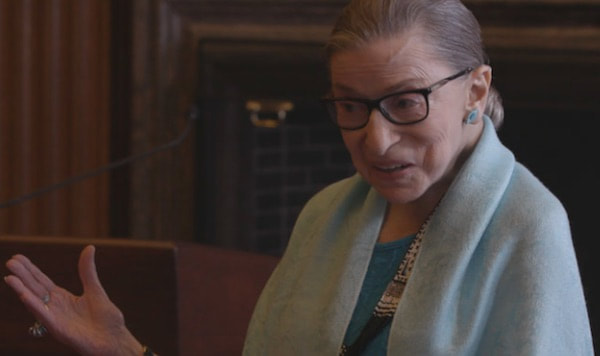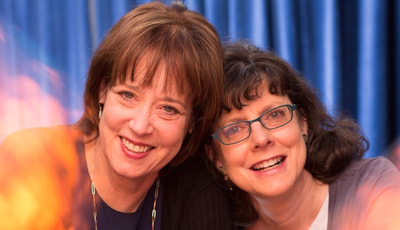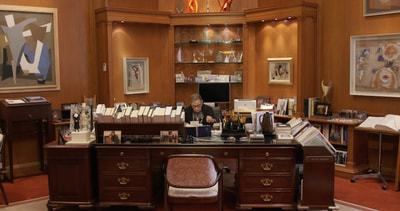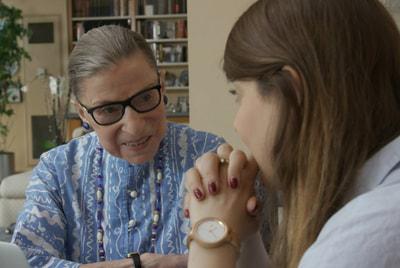|
Photos courtesy of Magnolia Pictures
Long before she became the pop icon and darling of millennials that she is and known as the Notorious RBG, Ruth Bader Ginsberg was quietly creating a legal legacy and effecting change. At 84 she is a living legend as a pioneer for women and minorities rights. Not only is she one of the few women who have ever been appointed to the Supreme Court, she is also one of the most blatantly liberal and vocal justices, taking her descents to an art form. Despite her impressive resume and interesting life, her journey to the high court has never been exhaustively documented with a definitive biography. With the recent release of the documentary, “RBG”, by directors Betsy West and Julie Cohen, that’s all changed. Bypassing traditional documentary feature methods of incorporating a heavy handed use of talking heads or linear story telling, the filmmakers present an engaging, exhaustive profile piece, with affection and humor. This is a complex character that on one hand works until the wee hours of the night, but on the other, is passionate about attending the opera while also having a great sense of humor about herself and new celebrity persona. She’s a pint size dynamo that does exhaustive regular gym workouts putting those half her age to shame. The filmmakers successfully portray all sides of their subject. They deftly combine Ginsburg’s personal and professional life through the perspective of key relationships, like her late husband and her granddaughter who recently graduated from law school, along with touchstone cases that make up her career. While promoting the film in San Francisco, I got the opportunity to discuss the project with West and Cohen. Here is some of our conversation. PF: How did you come to the conclusion that this was the project you wanted to take on, and did you know from the start that you would get the necessary access? Cohen: No to the second question! We decided to make a film of this subject matter based on things we had done in the past. Betsy and I had each interviewed Justice Ginsburg for separate projects in 2011 and 2013. Soon after, Ginsburg’s star was on the rise on the internet, becoming Notorious RBG. That led us to think that there ought to be a documentary about Ruth Bader Ginsburg, and why not us? West: Regarding access - In January 2015, we wrote her a letter explaining our desire to do a documentary about her life. We quickly got a response, basically saying, “Not yet.” Initially we were discouraged, but then realized that she didn’t say no or never, so we started talking to a few of her colleagues and friends. Then we wrote her again, with a different request, saying we’d still like to do the documentary but we don’t have to talk to you right away. We also submitted to her a list of who we’d like to interview for now, making it comprehensive and serious. We got an answer back from her, saying, “I wouldn’t be ready for two years.” From there, Ms. Ginsburg made several interview suggestions, leading West and Cohen to believe that on some level, she was on board. That led to the filmmakers securing producing partner CNN Film. From there, they began to shoot interviews and other footage for the project. At that point they even received lists of Ginsburg’s appearance schedule from her staff. PF: Did the unusual shooting schedule you ended up having, as in not getting access to your subject right away, informing the style you took of weaving in her significant cases, etc.? Cohen: Absolutely. We had the thought all along that we wanted to make this a combination of her legal legacy, which involved getting into some real nitty gritty of some cases she argued and won, but also show who she is as a woman and a human being. We wanted to learn about her childhood and her extraordinary marriage, one of the great feminist love stories of all time. PF: Given her age, it seems a bit unusual that she would decide to do the documentary, but put you off for two years. Did you ever find out why Ginsburg initially preferred to hold off participating in the project? West: We never found out definitively, but speculated that it was her way of gauge how serious we were about the endeavor. It helped us because although two years seemed like a long time, we did so much work before we interviewed her, that by the time we actually talked to her we had a rough cut. It turned out to be excellent to do it the way we did. As Ginsburg nears the end of her career and life, many wonder if the liberal justice considered retiring while President Obama was in office. The filmmakers never specifically addressed that in film, they speculate the issue based on other topics Ginsburg discussed. Cohen: Ginsburg said that she philosophically disagrees with the idea that a supreme court Justice should leave with the party of the president that put them in there. She believes this is a lifetime appointment and that she should do it as long as she’s capable. West: There’s also a personal component of this where Ginsburg loves working. It’s hard for her to envision what her life would be if she wasn’t throwing her time into what is now the main love of her life, especially since Marty is gone. PF: Did anything about her surprise you or especially delight you? Cohen: One surprise was her reaction to the whole late-in-life celebrity that she’s attained. Not that she’s become a social media maven. She’s not initiating anything, but she’s tickled by it and is embracing it. We showed her the SNL parody of herself, which she had never seen, and once she realized what it was, she couldn’t stop laughing. In addition to portraying Ginsburg’s love for the law and legal institutions, it lovingly highlights the personal relationships that brought so much purpose to her life. She and Justice Antonin Scalia could not have been more different from a legal perspective, but thrived as friends, sharing a love for the opera. Her late husband, Marty who was known for his outgoing personality and fun sense of humor, was a constant source of joy and support. West: The friendship of Ginsburg and Scalia is a great example of two people with very different philosophical differences who respected each other and were able to talk in a civil manner about those differences within the context of our democracy. It’s a testament to both of them and should be something that we all aspire to. Throughout, the filmmakers carefully craft elements of their subject’s personal life, personality, along with Ginsburg’s professional agenda. Cohen: There are two legacies. One is enshrining a whole rule of law where the genders are equal under the 14th Amendment. For example, as an attorney, it was her legal strategy and ultimately decision she made in the U.S. vs Virginia Military Institute case, really made that happen. That’s in the law now because of her. Then there’s a current legacy presented by her current descents. How that will impact future laws is yet to be seen. “RBG” is a unique and enjoyable character exploration in part because who Ginsburg is, but also how the filmmakers approached and present the film. With it, Cohen and West have created a well rounded portrait of someone who is undeniably an important historical figure, but also very much alive and present who oddly enough is coming into her greatest fame at the age of 84.
0 Comments
Leave a Reply. |
AuthorPaula Farmer. Archives
June 2024
Film |




 RSS Feed
RSS Feed